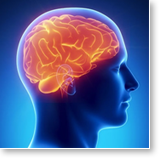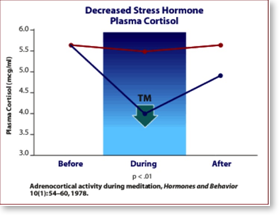 Getting rid of stress so that we can have a calm, creative mind is a good reason to practice the Transcendental Meditation technique each day. Scientists seem to keep giving us even more incentives to meditate.
Getting rid of stress so that we can have a calm, creative mind is a good reason to practice the Transcendental Meditation technique each day. Scientists seem to keep giving us even more incentives to meditate.
The list below of new research findings about the effects of stress appeared in a recent Huffington Post article by Amanda Chan.

1) Stress weakens our body’s ability to heal
A recent animal study conducted by Wake Forest University researchers and published in the Journal of Clinical Investigation showed that stress may help cancer cells survive against anti-cancer drugs.
Moreover, the period when an individual is being diagnosed and treated for cancer, and the period after the cancer has been “beaten,” are extremely stressful. Researchers at the University of Miami found that managing stress can improve the outcomes of the disease.

2) Stress shrinks the brain
Research conducted at Yale University and reported in the journal Biological Psychiatry found that stressful occasions, such as going through a divorce or losing a job, can actually shrink the brain by reducing gray matter in regions tied to emotion and physiological functions. This is vital because such changes in brain gray matter could signal future psychiatric problems.
3) Stress prematurely ages children
Young children who are exposed to bullying, abuse or intense violence had shorter telomeres—a sign that they were aging faster—and which could then lead to premature aging of brain cells, according to research in the journal Molecular Psychiatry.

4) Stress could negatively affect your child’s genes
The adverse effects of stress on an individual’s genes may be passed on from generation to generation, according to recent research conducted at the University of Cambridge and reported in the New Scientist. The findings undermine previous assumptions that certain markings to the genes influenced by outside factors, such as stress, were thought to be erased in the next generation.
5) Stress makes colds worse
Research shows that stress has deleterious impact on the immune system, with one recent study in the Proceedings of the National Academy of Sciences showing that stress can make colds worse. Researchers explain that the body produces more cortisol under stress, which can wreak havoc on the body’s inflammatory processes.
___________________________________
Fortunately, our bodies are designed to eliminate stress, and daily TM practice has been found to be a natural way to give the nervous system a means to gain the kind of deep rest that gives our bodies a chance to release stress. Scientific studies have shown that the daily practice of the TM technique helps eliminate stress and increases a person’s resistance to stress.

For example, research funded by the National Institutes of Health has found that during the 20 minutes of TM practice people experienced a significant decrease in a major indicator of stress—the hormone cortisol. This replicated an earlier study that found that cortisol levels were markedly reduced during TM practice, compared to no-change in the cortisol levels of non-meditating control subjects sitting for 20 minutes with eyes closed (see chart to the right). Research also found that as a result of regular TM practice that meditators exhibit greater autonomic stability and faster habituation to stressful stimulus, and greater efficiency of brain functioning when faced with a stressful activity.
I think that one of the most impressive studies was conducted at the University of California at Irvine using advanced fMRI (functional magnetic resonance imaging technology). The study found that people practicing TM for as little as five months had more than 50% less reactivity to a stressful stimulus than when they started TM practice.
In his recently updated book, Transcendental Meditation: The Essential Teachings of Maharishi Mahesh Yogi, author Jack Forem points to the essential role that release of stress plays in the goals of daily practice of the TM technique.
“Years before stress was recognized as the serious health problem that it is, Maharishi spoke about it and proposed that practicing TM could reduce the impact of stress. He defined stress as an imposition on the body and nervous system caused by experience our body and mind can’t comfortably handle, whether relatively mild (a loud noise, bright light, a surprise) or extremely intense (war, tsunamis, physical or sexual abuse), which leaves a deep impression on us but which can be neutralized or removed by gaining sufficient rest to heal it. TM, by providing the depth of rest necessary to dissolve this stress, clears the system day by day for healthier functioning and greater enjoyment.”
Jack cites the founder of the concept of stress in modern medicine, Hans Selye, M.D., Ph.D., the pioneering researcher and former director of the Institute of Experimental Medicine and Surgery at the University of Montreal where he published 1,700 research papers, 15 monographs and 7 popular books related to his research on stress.
“Research already conducted shows that the physiological effects of Transcendental Meditation are exactly the opposite to those identified by medicine as being characteristic of the body’s effort to meet the demands of stress…. I would refer to it as a method which so relaxes the human central nervous system that it can live with stress better, that it doesn’t suffer from stress.”
Thus it’s no wonder that more and more doctors, including bestselling authors Dr. Norman Rosenthal and Dr. Pam Peeke, are prescribing the TM technique to their patients. And with the compelling data showing that TM practice not only reduces stress but also cuts medical expenditures, it may not be long before the Transcendental Meditation program is incorporated as a core component in the health care programs in the private and public sectors, which are looking for evidence-based approaches to reduce spiraling costs.
______________________________________
To view short videos of doctors discussing the value of the Transcendental Meditation for those suffering from stress-related health issues, go to: https://www.tm.org/healthprofessionals-washington-dc/



